|
|
|
Sort Order |
|
|
|
Items / Page
|
|
|
|
|
|
|
| Srl | Item |
| 1 |
ID:
111568
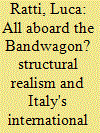

|
|
|
|
|
| Publication |
2012.
|
| Summary/Abstract |
Italy's foreign and security policy since the end of the Cold War is best accounted for by a structural realist framework rather than by liberal and constructivist accounts. More specifically, since unification and also in the post-Cold War period, the main feature of Italy's international collocation has been a dialectical interaction between a structural tendency to "bandwagon" with the hegemonic Power, which can guarantee the protection of Italian interests and forestall the risk of exclusion, and the search for regional autonomy. Italy's structural, dialectical interaction between "bandwagoning" and the search for autonomy is a response to opposite systemic incentives: Italy "bandwagons" every time the international status quo unravels or when a new order is being imposed; it endeavours to assert a more independent role in periods of international stability. During the Cold War, Italy bandwagoned with the United States, whilst European integration and a limited number of initiatives in the Mediterranean saw it attempt to preserve a degree of regional autonomy. The end of the East-West division, replacing scenarios of a nuclear attack or of conventional warfare along the East-West border with the unpleasant prospect of "entrapment" in neighbouring local crises, rekindled the tension between Italy's structural tendency to side with the hegemonic Power and its aspiration to regional autonomy.
|
|
|
|
|
|
|
|
|
|
|
|
|
|
|
|
| 2 |
ID:
111566


|
|
|
|
|
| Publication |
2012.
|
| Summary/Abstract |
In August 1962, the Kennedy Administration secretly sold Hawk missiles to Israel. To the chagrin of many American officials, the arms sale became public one month later. This revelation had a profound impact on Arab-American relations. Alongside the American military intervention in the Lebanon crisis of 1958, the Hawk sale solidified the cultural process in which the United States became an "imperial" power in Arab-Muslim imaginations. Through its perceived sponsorship of Israeli militarism, the United States was deemed guilty of empire by association. Washington's open association with Israel led many to perceive Tel Aviv as an agent of the American Empire.
|
|
|
|
|
|
|
|
|
|
|
|
|
|
|
|
| 3 |
ID:
111570
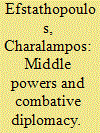

|
|
|
|
|
| Publication |
2012.
|
| Summary/Abstract |
Middle Powers are generally understood to perform diplomatic functions of constructive engagement and consensus-building to facilitate agreement in international negotiations. Middle Powers may, however, adopt more confrontational roles, especially when their accommodative functions become deficient. Whilst theoretical perspectives on Middle Powers account for such roles, limited empirical evidence has been provided to explore the conditions under which they revert to combative diplomacy. This article contributes to this area by examining the role of South Africa in the 2003 Cancun Ministerial Conference of the World Trade Organisation. During this period, South Africa shifted to a more confrontational approach epitomised by the heightening of its public diplomacy against developed countries and its co-leadership of the G-20 coalition of developing countries. The Cancun Ministerial collapse reflected both the possibilities and limitations of combative diplomacy as South Africa enhanced its international prestige but failed to extract any meaningful concessions, whilst triggering the threat of diplomatic retaliation by the major trading powers.
|
|
|
|
|
|
|
|
|
|
|
|
|
|
|
|
| 4 |
ID:
111567
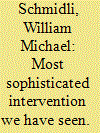

|
|
|
|
|
| Publication |
2012.
|
| Summary/Abstract |
In May 1977, in a public forum, President Jimmy Carter laid out the foundations of a distinctive foreign policy programme for the United States. He offered a striking shift away from the Cold War realpolitik of previous American administrations. Human rights, he declared, would be a central component of United States foreign policy. The growing instability in Central America, especially in Nicaragua, during Carter's term of office provided a major test of his Administration's new programme. And its ultimate response to Nicaraguan instability thus provides key insight into the strengths and weaknesses of the thirty-ninth President's attempt to move beyond traditional, hard-line Cold War diplomacy.
|
|
|
|
|
|
|
|
|
|
|
|
|
|
|
|
| 5 |
ID:
111564
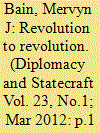

|
|
|
|
|
| Publication |
2012.
|
| Summary/Abstract |
It has traditionally been assumed that the relationship between Moscow and Havana commenced with the victory of the Cuban Revolution. Although it subsequently developed to unprecedented levels, this article examines the relationship in the period between the Russian and Cuban Revolutions. This analysis is conducted within the framework of Soviet policy towards the Developing World and the realist paradigm of International Relations theory. Prior to January 1959, the Kremlin took a considerable interest in Cuba and did not suffer from "geographical fatalism" as has previously been presumed. This is important in itself, but also for the relationship that rapidly developed in the aftermath of the Cuban Revolution as a number of factors that were important in the pre-1959 relationship would also be significant after 1959. Furthermore, this analysis is also important for the contemporary bilateral relationship as both governments have made increasing reference to the multifaceted relationship that existed priorx to 1959.
|
|
|
|
|
|
|
|
|
|
|
|
|
|
|
|
| 6 |
ID:
111569


|
|
|
|
|
| Publication |
2012.
|
| Summary/Abstract |
The cultural heritage of Honduras offers a critical platform for United States heritage diplomacy under the United States Department of State, Bureau of Educational and Cultural Affairs, Cultural Heritage Center. Of specific note is the formal 2004 Honduran-American Memorandum of Understanding for the preservation of cultural property and, beginning in 2001, periodic projects under the Ambassadors Fund for Cultural Preservation. The diplomatic efficacy of American cultural heritage policy and the Ambassadors Fund comes from long-term, sustained funding from the National Science Foundation, the National Endowment for the Humanities, and the Fulbright Program. Established networks by archaeologists have enabled the successful re-entry of United States cultural diplomacy in Honduras in the last decade.
|
|
|
|
|
|
|
|
|
|
|
|
|
|
|
|
| 7 |
ID:
111565


|
|
|
|
|
| Publication |
2012.
|
| Summary/Abstract |
This article examines the enduring significance of the "Manchurian Problem" to pre-Second World War Japanese foreign policy and shows how the 1931 Manchurian incident and the creation of Manchukuo in 1932 came to be regarded by many in the Japanese government as the solution to this three-decade long problem. The focus of the analysis is the career of five-time foreign minister, Uchida Yasuya (1865-1936), who not only influenced policy from his positions as a diplomat in the field but also formulated Japan's Manchuria policy as foreign minister in parts of three successive decades. Uchida and many moderates like him voluntarily supported Army plans on the continent, suggesting that, in contrast to the conventional understanding that the founding of Manchukuo marked the beginning of Japanese expansionism and militarism, the events of the early 1930s represented the culmination of over three decades of Japanese efforts at solving the Manchurian problem.
|
|
|
|
|
|
|
|
|
|
|
|
|
|
|
|
| 8 |
ID:
111571
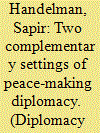

|
|
|
|
|
| Publication |
2012.
|
| Summary/Abstract |
In terms of the question, "how to create an effective peace-making process in the Israeli-Palestinian case," this article argues that the answer is a multidimensional approach to peace-making diplomacy that contains two main settings: political-elite diplomacy and public diplomacy. Political-elite diplomacy suggests various modes of peace-making interactions between political-elites. Public diplomacy provides instruments to involve the people in the peace-making struggle, prepares them for a change, and presses the leadership to reach agreements. The analysis suggests establishing an institution for the operation of public diplomacy-a major Israeli-Palestinian public negotiating congress. The congress is a democratic peace-making institution that invites representatives of the opposing societies to discuss, debate, and negotiate solutions to their struggle. The article also presents the concepts of political-elite diplomacy and public diplomacy as competitive settings that should be regarded as complementary. It includes lessons from the "Minds of Peace Experiment"-a small-scale Israeli-Palestinian public negotiating congress-which has been conducted in different places around the world.
|
|
|
|
|
|
|
|
|
|
|
|
|
|
|
|
|
|
|
|
|